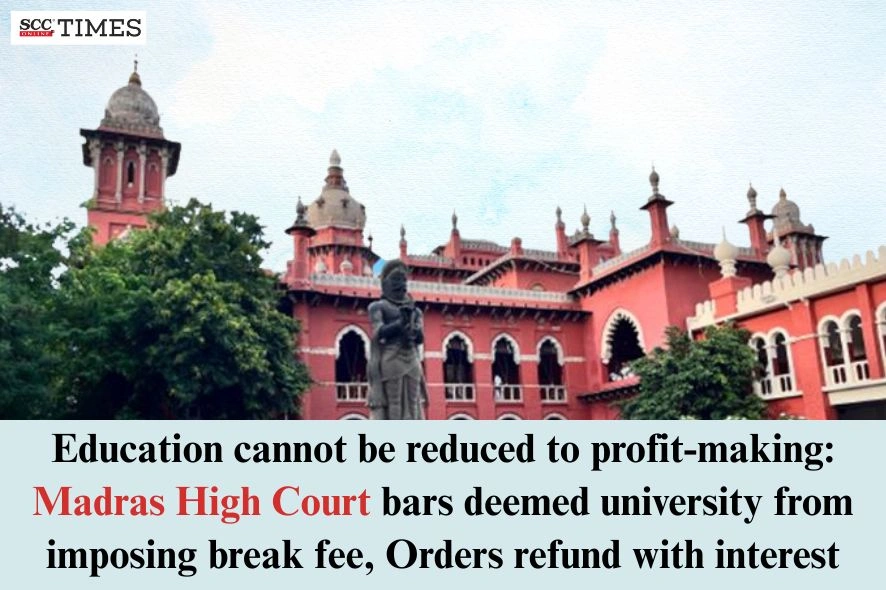Madras High Court: While adjudicating a batch of writ petitions under Article 226 of the Constitution, wherein the petitioners challenged the imposition of a “break fee” by Chettinad Academy of Research and Education (‘CARE University’), a deemed-to-be university, the Single Judge Bench of G.K. Ilanthiraiyan, J., held that the demand was arbitrary, unlawful, and in violation of the University Grants Commission (‘UGC’) Regulations and the Medical Council of India Regulations. The Court observed that reliance on the university’s handbook and circulars to justify the levy could not override statutory provisions, and further noted that the prospectus contained no reference to any such fee. Consequently, compelling students to attend extra classes and charging them for the same was found to be arbitrary and contrary to the governing regulatory framework.
Background:
The petitioners were admitted under the management quota in the MBBS course during the academic years 2014—15, 2017—18, and 2018—19. They cleared all examinations, including arrears, and became eligible for internship. At the stage of internship, the university demanded a break fee of Rs 2,00,000 per arrear subject along with Rs 35,000 examination fee, failing which students were denied access to the college, blocked from internships, and had their provisional certificates withheld.
The petitioners contended that the demand was arbitrary and without jurisdiction, as fee structures are regulated by the UGC and National Medical Council. They relied on UGC Regulations, Section 24 of the University Grants Commission (Institution deemed to be universities) Act, 1956 (‘UGC Act’), and Government Order of 2007, which prohibit collection of capitation fee or any charges beyond what is declared in the prospectus. The UGC supported this position, stating that institutions cannot levy fees other than those prescribed and must not retain original certificates.
The CARE University, however, argued that the break fee was not capitation but tuition for supplementary classes conducted for failed students. It claimed that regulations mandated extra classes for those with attendance deficits or failures, and that the handbook and circulars had informed students about extended course fees. It further contended that the issue of fee fixation was already pending before the Supreme Court, making the writ petitions not maintainable.
Analysis and Decision:
The Court observed that Clause 24 of the UGC Regulations provides for admission and fee structure, and noted that collecting donation or capitation fee, in whatever nomenclature or form, either directly or indirectly, is strictly prohibited. The Court emphasised that fees must be collected only as declared in the prospectus of the institution, with proper receipts, and institutions may provide concessions or scholarships but cannot impose undisclosed charges.
The Court further noted that Regulation 7 of the Medical Council of India Regulations on Graduate Medical Education, 1997 prescribes the duration and structure of the MBBS course, including supplementary examinations, but nowhere mandates supplementary classes. The Court highlighted that while CARE University relied on its handbook and circulars to justify the break fee, such documents cannot override statutory regulations. It was observed that the prospectus did not mention any break fee, and therefore compelling students to attend extra classes and charging them for the same was arbitrary and contrary to the governing regulations.
The Court emphasised that education must not be perceived merely as a commercial venture undertaken for profit; it is, and must remain, a noble service to society that carries with it a profound moral and constitutional responsibility. It was highlighted that institutions bear the responsibility of nurturing intellects and shaping responsible citizens, and profiteering undermines the very essence of education. The Court noted that the UGC and National Medical Council regulate fee structures for deemed universities, and by virtue of the Government Order of 2007, the Fee Fixation Committee had already prescribed tuition fees, prohibiting any additional or capitation charges.
Consequently, the Court directed CARE University not to charge any additional tuition fee in the form of break fee or miscellaneous fee. The Court further directed the State Government, UGC, and National Medical Council to implement the fee structure fixed by the Fee Fixation Committee across all deemed universities, including CARE University.
The Court, thus, ordered CARE University to refund deposits made by the petitioners pursuant to interim orders, with 6 per cent interest, within two weeks, and to release all educational certificates withheld from the petitioners to enable them to pursue their careers. Accordingly, the Court allowed all the writ petitions, closed connected miscellaneous petitions, and made no order as to costs.
[R. K. Sarathkumaran v. Chettinad Academy of Research and Education, 2025 SCC OnLine Mad 10196, 13-11-2025]
Advocates who appeared in this case:
For Petitioner: T. Gowthaman, Senior Counsel for R. Swarnavel
For Respondents: M. S. Krishnan, Senior Counsel for T. Balaji, B. Rabu Manohar, Special Panel Counsel, V. Sudha, Special Panel Counsel


